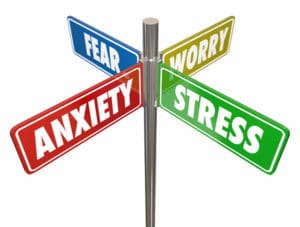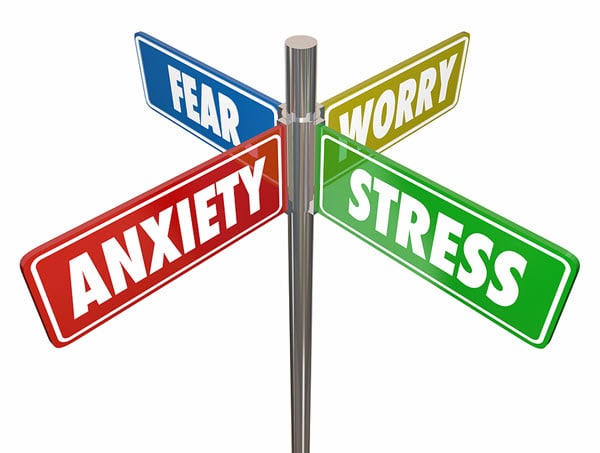Table of Contents
Key Takeaways
- Understanding the root causes of anxiety, often associated with neurotransmitter imbalances, is crucial.
- Certain nootropics can be effective in alleviating anxiety symptoms by targeting specific neurotransmitters.
- Acetylcholine, dopamine, and GABA are some neurotransmitters related to anxiety, and supplements like Alpha GPC, CDP-Choline, and L-Tyrosine can help modulate their levels.
- A trial-and-error approach may be necessary to find the most effective nootropic for individual anxiety relief.
- Nootropics offer a natural alternative to traditional anti-anxiety medications, with the potential for fewer side effects1.
This post is for you if tried anti-anxiety meds, Cognitive Behavioral Therapy, counseling, or psychotherapy. And are looking for a natural nootropic alternative to optimize your brain health.
Or maybe you tried talking to your doctor about how you feel and didn’t get the help you need.
It may be of little comfort, but did you know there is a 77% chance that your anxiety has been misdiagnosed as some physical problem instead?[i]
Because anxiety often manifests as sweating, trembling, nausea, abdominal problems, dizziness, insomnia, heart palpitations, accelerated heart rate, chest pain, shortness of breath, pins and needles, feeling like your losing control and/or feelings of impending doom.
Instead of dealing with the real cause, maybe you were sent down the wrong path. And are still looking for answers.
Nootropic supplements may help if you’re dealing with a genuine anxiety disorder. The kind of anxiety that has you feeling constantly on-edge and an overwhelming sense of dread.
The type of anxiety where you have difficulty concentrating, you’re irritable or restless to the point you’re avoiding family and friends just to numb yourself from feelings of worry and unrelenting doom. Stress hormones gone nuts.
You know, it’s that very type of stress that makes your blood pressure rise from doing too much, or being stretched thin and depression symptoms start to peak through your window and you may even begin to manifest this unresolved energy into panic attacks? Yeah, we’re talking about that kind.
Here you’ll discover the real cause of your anxiety symptoms. And get some help dealing with how you feel. Concrete steps to take that doesn’t include meditation, yoga, Cognitive Behavioral Therapy, or psychoanalysis.
The Root Cause of Generalized Anxiety Disorder
Something may have happened that triggered the anxiety that has turned your life upside down. But if your feelings of anxiety are hanging on and won’t let go, it’s likely because of the dysfunction of neurochemicals in your brain.[ii]
It could be problems with acetylcholine, dopamine, GABA, glutamate, norepinephrine, or serotonin.
But the challenge is figuring out which neurotransmitter is causing the problem. And why drugs like benzodiazepines, SSRIs, SNRIs, TCAs, and MAOIs are often prescribed for treating anxiety.
How to Find the Root Cause of Your Anxiety Symptoms
 If you have been using an anti-anxiety drug and experienced some relief in your symptoms, you have a head-start.
If you have been using an anti-anxiety drug and experienced some relief in your symptoms, you have a head-start.
Because now you have a clue what could be causing your problem. And it may be easier for you to decide which nootropics to try to help you get better and improve cognitive functioning.
First, become familiar with the mechanism of action (or pharmacology) of the med you are using. Wikipedia.org is a good resource for this information.
Simply do a search of Wikipedia for your drug’s generic name. And scroll down to the section “Pharmacology”. Sometimes called the “mechanism of action”.
Once you understand how the drug works in your brain. And which neurotransmitter system it affects. Scroll down the list of nootropic supplements below.
And choose one of the anti anxiety nootropics that has a similar mechanism of action to the drug you were using. Then follow the dosage recommendations for that supplement and try it to see if you feel any anxiety relief.
Typical signs of relief can include positive cognitive performance like reduced brain fog and mental fatigue, less emotional stress, and lowered blood pressure.
But if you’ve never tried using a pharmaceutical to treat your anxiety, or have used one that didn’t work, you’ll need to try each nootropic separately.
And by trial and error you’ll work your way down to find the neurotransmitter system that is causing your anxiety and mental disorders.
Start at the beginning of the list below and try the first nootropic for 1 or 2 days. And see how you feel. If you experience relief from your anxiety symptoms and improved mental health, success!
Now you know which neurotransmitter to work with. You can continue using that nootropic as recommended. And look for other natural nootropic adaptogens that work on the same system.
But if the first nootropic you try doesn’t provide any comfort for lowering your anxiety, put it aside. And try the next one for a couple of days again following dosage recommendations.
Go through the list one-by-one until you find a nootropic that helps you and relieves at least some of your anxiety symptoms.
Some of the nootropics on the list below are precursors. Which means it provides the chemical or molecule needed to make a specific neurotransmitter.
And others are adaptogens that affect a specific neurotransmitter system. Usually by modulating how that brain chemical works in your brain and improving cognitive function.
Let’s get started …
 Neurotransmitter imbalances
Neurotransmitter imbalances
Acetylcholine
Acetylcholine plays a critical role in learning and memory. And acetylcholine levels are modulated by levels of stress in several regions of your brain.
Acetylcholine levels decline as you get older. You need choline for the production of acetylcholine. Not eating enough foods high in choline can also result in insufficient acetylcholine.
In fact, choline is so vital to cognition and nerve function that, without it, we couldn’t move, think, sleep or remember anything.
Studies show that acetylcholine signaling in your hippocampus regulates social stress resilience and anxiety.[iii]
You can increase acetylcholine levels in your brain using either Alpha GPC or CDP-Choline (Citicoline).
Alpha GPC
 Alpha GPC is a precursor to the neurotransmitter acetylcholine. Alpha GPC naturally occurs in your brain as a byproduct of phosphatidylcholine (PC).
Alpha GPC is a precursor to the neurotransmitter acetylcholine. Alpha GPC naturally occurs in your brain as a byproduct of phosphatidylcholine (PC).
When your brain needs more choline, and the choline floating around in your brain is running low, it breaks down PC from cell membranes. And turns it into Alpha GPC.
Alpha GPC, acetyl L-carnitine (ALCAR), and phosphatidylserine (PS) provide mitochondrial support and conserve growth factor receptors.
DHA (Omega-3) combines with Alpha GPC and PS to form brain cell membranes critical for neuron generation and regeneration.[iv]
Recommended dosage of Alpha GPC is 300 mg 3-times per day.
CDP-Choline (Citicoline)
CDP-Choline is a type of choline that is present in every cell in your body.
Taken as a supplement, it’s then converted to cytidine and choline in your gut. Once it crosses the blood-brain barrier it’s converted back to CDP-Choline.[v] The choline then assists cell membranes and helps create acetylcholine.
CDP-Choline is involved in memory and cognitive functions. And provides energy for the brain to conduct sustained mental effort.
Recommended CDP-Choline dosage is 250 – 500 mg per day.
Dopamine
L-Tyrosine taken as a nootropic supplement converts into the neurotransmitter dopamine.
 Dopamine helps control movement in your body, is fundamental to memory, attention and problem solving.
Dopamine helps control movement in your body, is fundamental to memory, attention and problem solving.
The unused dopamine can then convert into the catecholamine neurotransmitters norepinephrine (noradrenaline) and epinephrine (adrenaline).
Norepinephrine is important for attentiveness, emotions, sleeping, dreaming, and learning.
Epinephrine drives your ‘flight-or-flight’ response. It’s what prompts your reaction to dangerous circumstances, emergency situations, or in stressful situations or environments.
Sleep deprivation and extreme stressors like heat and cold can deplete catecholamine levels. L-Tyrosine restores them to preserve optimal cognition and reduce anxiety.[vi]
Recommended dosage of L-Tyrosine is 500 mg 2 or 3-times per day.
GABA
GABA (Gamma-amino butyric acid) is the most abundant inhibitory neurotransmitter in your brain. And known to counterbalance the action of the excitatory neurotransmitter glutamate.
GABA has long been recognized as the main regulator of anxiety. And the GABA neurotransmitter system is the main target of benzodiazepines and other anxiety related drugs used to treat anxiety disorders.[vii]
When GABA is taken as a nootropic supplement, and contrary to what you may have read elsewhere, crosses your blood-brain barrier, it binds with the GABAA receptor protein complex, and acts as an agonist: inducing changes in which the permeability of the central pore to chloride ions gets increased.
The resulting chloride flux hyperpolarizes the neuron, leading to a reduction in its excitability. And producing a general inhibitory effect on neuronal activity.[viii]
Recommended dosage of GABA is 250 – 500 mg per day
Glutamate
L-glutamine is a ‘conditionally’ essential amino acid and main precursor for the production of glutamate and GABA in your brain.
(NOTE: Don’t confuse glutamine with glutamate!)
Glutamine is the most abundant amino acid in your body. And is involved in many of your bodily functions. Including much of the activity in your brain.
 But Glutamate is the main excitatory neurotransmitter in your brain.[ix] And the balance of glutamine and glutamate is critical for optimal brain function.
But Glutamate is the main excitatory neurotransmitter in your brain.[ix] And the balance of glutamine and glutamate is critical for optimal brain function.
Glutamate plays various important positive roles in your brain including brain development, learning and memory.
And degenerative roles including stroke, traumatic brain injury, Huntington’s and Alzheimer’s disease, stress response, and anxiety disorders.
Glutamate mainly acts through ion channel receptors including NMDA receptors, AMPA receptors, and G protein-coupled metabotropic receptors (mGluR1-8).
Glutamate is involved in synaptic release of acetylcholine, adenosine, kappa opioid, GABA, and neuropeptides.[x]
Recent research shows that glutamate dysfunction is involved in fear conditioning, OCD, PTSD, anxiety disorder and social phobia.[xi]
Monosodium glutamate (MSG) which is used as a flavor enhancer has been linked to obesity, metabolic syndrome, and neuron toxicity that can lead to cell death causing stroke, epilepsy, schizophrenia, anxiety, depression, Parkinson’s disease, Alzheimer’s disease, Huntington’s disease, and amyotrophic lateral sclerosis (ALS).[xii]
Eliminating your anxiety could be as simple as avoiding all foods containing MSG.
When your neurotransmitters, including L-glutamine and glutamate are in balance, you feel motivated, productive, and energetic. And you feel calm and relaxed during downtime.
When L-glutamine levels are low you feel filled with dread, you’re constantly worried, you have racing thoughts, and you’re frequently late and disorganized.
When you are in this L-glutamine slump is when you’re tempted to resort to high carbohydrate foods, and drugs or alcohol to relax.
Recommended dosage of L-Glutamine is 2 – 5 grams per day.
But remember, glutamine and glutamate must be in balance! If you suspect your glutamate levels are too high, you can get it under control by inhibiting its NMDA and AMPA receptors.
Some antidepressant drugs relieve anxiety by inhibiting NMDA receptors.[xiii]
Try the nootropics including Cat’s Claw[xiv], and L-Theanine[xv] for inhibiting NMDA receptors. And Noopept[xvi] and many of the racetams[xvii] which inhibit AMPA receptors.
Keeping glutamate under control and helping to reduce anxiety if your condition is caused by glutamate dysfunction.
Serotonin
Serotonin plays a significant role in the development and persistence of anxiety disorders.
 Several studies show that increases in serotonin increases anxiety. And when serotonin decreases you may experience a reduction in the anxiety that’s associated with OCD or PTSD[xviii].
Several studies show that increases in serotonin increases anxiety. And when serotonin decreases you may experience a reduction in the anxiety that’s associated with OCD or PTSD[xviii].
Too much serotonin and excess serotonin signaling has been implicated in social anxiety disorders.[xix]
If you are experiencing any type of anxiety, you should avoid anything that increases serotonin. Do NOT use nootropics like L-Tryptophan or 5-HTP.
Instead, use nootropics that help modulate serotonin and bring it under control.
Bacopa Monnieri helps modulate serotonin and dopamine which produces an anxiolytic effect. Studies show that Bacopa is as effective as the anti-anxiety drug lorazepam in reducing anxiety.[xx]
Vitamin D3 and Omega-3s (EPA & DHA) helps control serotonin synthesis and action. EPA helps inhibit serotonin release and DHA influences serotonin receptors. While Vitamin D3 deficiency can contribute to anxiety. Supplementing with Omega-3s and Vitamin D3 may help reduce anxiety.[xxi]
Ginkgo Biloba acts as a monoamine oxidase inhibitor (MAOI) which helps boost dopamine in your brain. Increasing dopamine can help lower serotonin levels. The result can be a reduction in anxiety.[xxii]
Rhodiola Rosea is an adaptogen that has been used in traditional medicine for thousands of years. Rhodiola enhances stress tolerance and relieves anxiety by modulating key brain neurotransmitters such as serotonin, norepinephrine and beta-endorphins (opioid neuropeptides).[xxiii]
Anxiety Disorders Eliminated
Nootropics are a viable and potent alternative to many anti-anxiety medications.
But you first need to determine the cause of anxiety in your brain. Use the trial and error method I suggested above and work through the nootropic supplements recommended one-by-one.
If you are not experiencing any results from taking a single nootropic, it may be that a combination of nootropics may be required to get the job done, and once the cross the blood brain barrier, have an effect.
Just remember, that the goal of experimenting is to find what works best for you is so you can determine what gets you the best results for reducing stress, improved mental energy, and reduce anxiety symptoms.
But a very strong word of caution – if you are currently using any prescription anti-anxiety or antidepressant medications. Or any medications for that matter. Research each nootropic including side effects and prescription drug interactions before using them.
You can relieve anxiety and bring on stress relief once-and-for-all with nootropics. If you do your research. And are willing to experiment until you find the one or two that is right for you, and mental clarity will come.







Join The Discussion - 173 comments
José
September 24, 2023
Hi David! Question. You have probably explained this before but I haven’t been able to find it. I’ve been on Sertraline for 3 years. Prescribed mainly for anxiety when I was going through a rough time in the pandemic. Worked very well but had the typical side effects. I have slowly tapered a couple of times in the past year but when finally stopping I’ ve had big time rebound/withdrawal symptoms. So I end up increasing the dose again. I am tapering again and have been on 12.5 mgs for a while and wishing to stop. Do you have suggestions to support this final stage of tapering? Without creating a big colpase in my system. I recently started taking pharmagaba, aniracetam, b complex and inositol with good results. Thanks for all your help!
David Tomen
September 26, 2023
José, there is no easy answer for dealing with discontinuation syndrome. You are doing the right thing. My unqualified advice is keep tapering off veeerrrrr slowwwwly.
The thing with these drugs is desensitized receptors. Trying to fix those receptors so neurotransmitters have something to bind to take time. Our brain depends on Nerve Growth Factor and Brain-Derived Neurotrophic Factor for neurogenesis needed to fix these things. All you can really do is use nootropics to boost both and be willing to deal with feeling like crap for awhile.
Jose
September 27, 2023
Thank you for your answer! super helpful as always. And thank you for helping so many people find alternatives to improve their life.
"Nordic"
June 11, 2023
Hi, intersting website, anxiety seems to be common issue. I tried to write this so many times, but it comes out too long every time.
Both me and my spouse have been suffering anxiety, OCD, and lack of motivation. My anxiety is mostly social, while spouse’s is more of racing thoughts kind. Some days I also feel slow, and can’t keep up with conversations, I’m 30, but that makes me feel like almost as I was old and demented.
We took the Braverman test mentioned in Comments, we got similar results, only that I had 2 Major deficiencies and she had moderate ones, I was at least moderately deficient in all but mostly severely in GABA according to the test.
I have been taking Ashwaganda, but that alone makes me feel even more drowsy, taking maca with it has helped thought. It does seem to help with OCD but not so much with the other problems. (social anxiety and lack of motivation). I also added B-vitamin complex and Magnesium. Summer time is currently helping, at winter i’ve felt so depleted of everything here in Northern Europe.
Sadly spouse had adverse reaction to ashwagandha, it seemed to make her lethargic and depressed. It actually helped her not to take Aswagandha but just taking B-vitamin complex and magnesium. I wonder why is that?
I think we definitely need something to get us on track with life, before it just passes by. I don’t know what to add next. Reishi made me feel terribly lethargic and 5-HTP made me feel sad (When i took it couple years ago) like instantly. So at least not those.
Mucuna Pruriens? L-Tyrosine? Gingko Biloba? Something to take off social anxiety and lack of motivation. Ohh… and the terrible indecisiveness, I was contemplating for days before even posting this simple message.
That braverman test also said that I was Choline dominant natured, not quite sure what that means, but I was still deficient in all. Don’t know how accurate it is after all.
David Tomen
June 12, 2023
Nordic, that’s a lot in a few paragraphs and I’m not about to try and respond here. Ashwagandha is contraindicated with those with thyroid issues. I am hypothyroid and cannot use Ashwagandha.
It sounds like you need a consultation. If you are interested go to this page and you’ll find a link to my calendar: https://nootropicsexpert.com/personal-consultations/
Chantelle Hamilton
June 7, 2023
Hello, I have been dealing with anxiety for an entire year now. Specifically, shortness of breath (air hunger), heart palpitations, dizziness, fatigue, brain fog, low mood and low libito. I have had a number of tests done including a full cardiac panel and everything is normal. What nootropics would you recommend to start? Desperate for your help! Thanks
David Tomen
June 9, 2023
Chantelle, did you read the above article before you posted your question? I suggest you do that and then come back to ask your questions. Because you will realize that it is impossible to suggest what you should try without knowing a LOT more than just your symptoms.
I do not mean to be harsh about this so please do not take it that way. Anxiety can be caused by a very long list of things. And it takes time to dig down to figure out what to try.
Miraka
February 2, 2023
”If you are experiencing any type of anxiety, you should avoid anything that increases serotonin. Do NOT use nootropics like L-Tryptophan or 5-HTP.”
But what if you have depression, feeling depressed,?, which is in most cases based on low serotonin, and comes often with anxiety, this level should be raised right? What would you recommend instead of L-Tryptophan or 5-HTP?
So could you say that too much serotonin causes, or can cause, anxiety?, and more of it will make that worse maybe…
David Tomen
February 3, 2023
Miraka, it is simply not true that depressions is caused by a lack of serotonin. We were conditioned to think that because the pharmaceutical companies needed to sell their newly discovered SSRIs.
Excess serotonin will cause anxiety. Serotonin, like all your other major neurotransmitters must be in balance. So you need serotonin but not too much.
I suggest going back to the very top of this article and reading it word for word all the way to the bottom. Because clearly you skipped down to the part about L-Tryptophan and 5-HTP.
Cheryl L March
December 7, 2022
I looked up the author on the internet and couldn’t find a way to get in touch. Please contact me if you see this. I need your help.
David Tomen
December 10, 2022
Cheryl, you are not alone. Nearly everyone who comes to Nootropics Expert is looking for help. I also offer personal consultations if you are interested. Here is a link to my calendar: https://calendly.com/davidtomen/60-minute-consultation-with-report
Jonathan
November 24, 2022
David, first of all, thank you for the excellent material. I suffer for several years from Panic Attacks (mostly triggered by agoraphobia). I am currently not taking any medication and was looking for more “natural” ways of treating it. What do you recommend me to start?
David Tomen
November 28, 2022
Jonathan, for Panic Attacks best that you schedule a consultation with me: https://calendly.com/davidtomen/60-minute-consultation-with-report
Juan
November 8, 2022
Si el unico que realmente funciona es el L Tripotofano, pero solo me funciona en la mañana, Para dormir excelente esa misma noche. Me ha curado de entradas y salidas a benzos. Como regulo la dopamina a largo plazo? Es decir, tomo l triptofano en dosis normales 400 500 mg diarios, en la mañana. en la noche me genera insomnio. Entonces en que momento deberoa tomar fenialanina o l tirosina? ya que utilizan los mismos canales de absorcion.
David Tomen
November 9, 2022
Juna, if you use 500 – 1000 mg of L-Tyrosine morning and noon your system will get enough of this amino acid to raise dopamine levels. Even while using L-Tryptophan.
Marius
November 1, 2022
Can I safely use gaba 500mg with valerian 300-600 mg and l-theanine 250mg plus st.John wort ?
David Tomen
November 3, 2022
Marius, there are no clinical studies testing the safety of that combo. The first 3 should be no problem. But combining them with St. John’s wort may not be such a good idea.